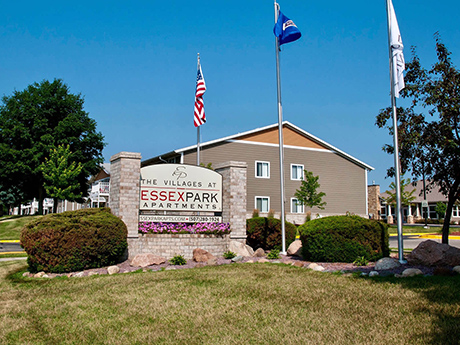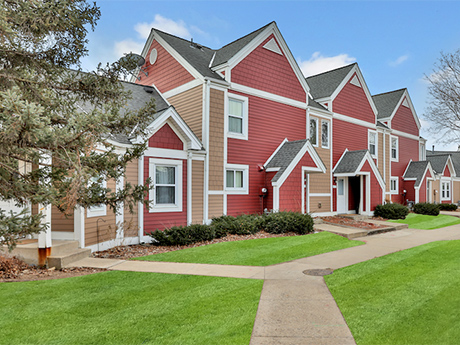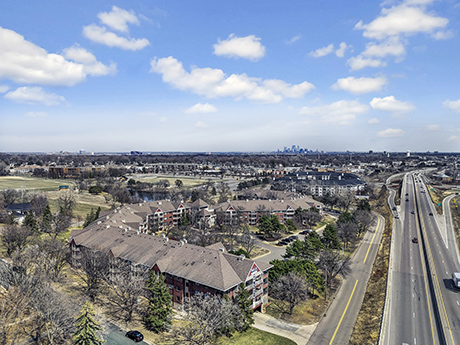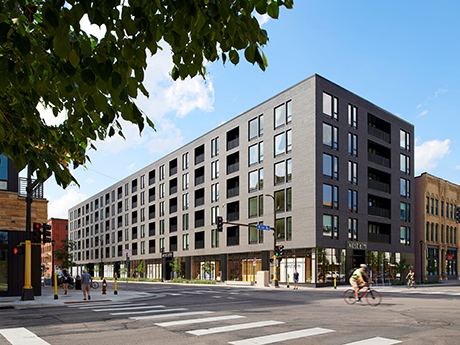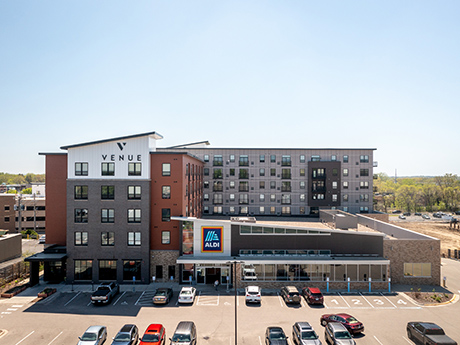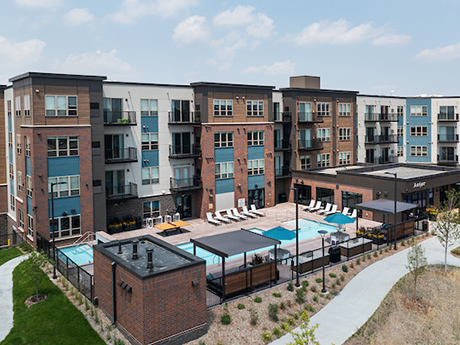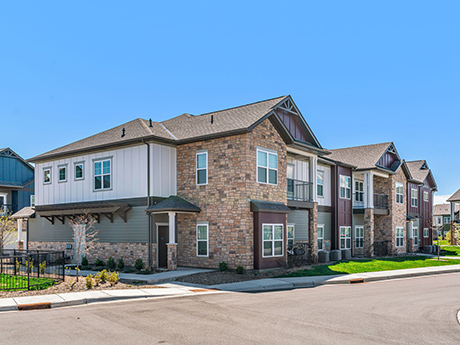ROCHESTER, MINN. — JLL Capital Markets has arranged the sale of The Villages at Essex Park, a 288-unit multifamily community in Rochester. Situated near the Mayo Clinic and the city’s medical district, the property comprises two phases. Essex Park was built in 1999 and includes 144 units. Essex Place, constructed in 1991 and renovated in 2013, features 144 Section 42 income-restricted units at 60 percent of the area median income. Units average 1,005 square feet. Amenities include a clubhouse, fitness center, pool, playground and picnic areas. Josh Talberg, Joseph Peris, Doug Childers and Jack Graveline of JLL represented the seller, Dominium, and procured the buyer, Black Swan Real Estate.
Minnesota
NORTHFIELD, MINN. — JLL Capital Markets has arranged the sale and financing for Jefferson Square, a 50-unit HAP townhome community in Northfield, about 45 miles south of Minneapolis. The property sits on 5.2 acres and includes nine residential buildings, three parking structures and one administrative building. Amenities include private garages, a community lounge, picnic space, tot lot and media space. Josh Talberg and Joseph Peris of JLL represented the seller, Dominium Management, and procured the buyer, an investment firm specializing in affordable and workforce housing. The buyer plans to invest capital to refresh the units and common areas in addition to extending the existing affordability restrictions. C.W. Early of JLL led the debt advisory team.
ST. LOUIS PARK, MINN. — JLL Capital Markets has arranged the sale of Helix Apartments, a 167-unit property in the Minneapolis suburb of St. Louis Park. Built in 1985 and extensively renovated between 2020 and 2022, Helix Apartments features units averaging 990 square feet. Amenities include a pool, fitness center, community lounge with coffee bar, rooftop terrace, dog park and walking paths. Josh Talberg, Joseph Peris and Jack Graveline of JLL represented the seller and procured the buyer, Jason Quilling of QT Holdings.
MINNEAPOLIS — CBRE has brokered the sale of Second + Second, a 158-unit apartment complex in the North Loop of Minneapolis. The property is located at 120 N. Second St., just west of the Mississippi River. Built in 2020, the asset features a range of studio, one- and two-bedroom floor plans averaging 863 square feet. Amenities include underground parking, a sky lounge, fitness center and pet wash station. CBRE’s Ted Abramson, Abe Appert and Keith Collins represented the seller, Solaris Group. Roundhouse was the buyer.
PLYMOUTH AND BURNSVILLE, MINN. — Davis Medical Investment Fund (DMI Fund) has acquired two Minneapolis-area outpatient medical properties for $21.9 million. The properties include a 30,250-square-foot, single-story outpatient building in Plymouth that was purchased for $12 million. The property was fully renovated and expanded in 2019, adding 15,000 square feet. At the time of sale, the building was fully occupied. Fresenius anchors the property and occupies roughly one-third of the space, offering nephrology specialty services. Fresenius renewed its lease earlier this year. In Burnsville, Davis acquired the Pondview Medical Building, a two-story, 34,224-square-foot property, for $9.9 million. At the time of sale, the building was fully leased to four tenants, including anchor tenant Southdale Pediatrics. Pondview was developed in 2005 and received significant updates in 2024. The acquisitions follow Davis’ recently announced refinancing of 19 properties totaling $171 million with Capital One Healthcare Finance. Leveraging its new $250 million line of credit, Davis continues to expand the DMI Fund’s investment portfolio, which now includes more than 20 properties totaling nearly 885,000 square feet across eight states.
FARIBAULT, MINN. — Marcus & Millichap has negotiated the $6.5 million sale of Pleasant View Estates, a 36-unit assisted living and memory care facility in Faribault, about 50 miles south of Minneapolis. Built in 1998, the property sits on 4.8 acres at 41 Brand Ave. The 44,300-square-foot facility includes 24 one-bedroom units and 12 two-bedroom units. Approximately 75 percent of the residents are Medicaid assisted living facility occupants. The building is connected to a vacant skilled nursing home formerly known as Pleasant Manor. Ray Giannini of Marcus & Millichap represented the seller, Monarch Healthcare Management, and procured the buyer, a regional private investor.
TWO HARBORS, MINN. — Kraus-Anderson has completed a trails and landscape renovation at Split Rock Lighthouse in Two Harbors along Lake Superior. Designed by Quinn Evans, the project returns circulation patterns to their historic locations with modifications for accessibility needs of the site, including a new ADA ramp, a precast boardwalk that follows the path of the original tramway, structural components and new fencing. The site was designated as a National Historic Landmark in 2011. The Minnesota Historical Society directed archeological efforts. The lighthouse remained open to the public during the majority of construction, which began in May. Split Rock Light Station was completed in 1910, and for half a century it helped freighters carry freshly mined ore from Minnesota’s Iron Range. The State of Minnesota obtained the historic and scenic landmark in 1971 and transferred administrative responsibility for the 25-acre Split Rock Lighthouse historic site to the Minnesota Historical Society in 1976. The historic core has been restored to its early 1920s appearance. The project was made possible by the people of Minnesota through an appropriation made by the Minnesota Legislature and approved by the governor.
CHANHASSEN, MINN. — Colliers has arranged the sale of Venue Apartments, a 134-unit apartment complex in the Twin Cities suburb of Chanhassen. The property opened in 2019 and is anchored by an Aldi grocery store, which is separately owned and was not part of the transaction. Amenities include a rooftop deck, business center, fitness facility, clubroom, sports simulator, coffee bar, underground heated parking and automated package delivery. Mox Gunderson, Dan Linnell, Adam Haydon and Devon Dvorak of Colliers represented the seller, Minnesota-based Roers Cos. Edina, Minn.-based Highland Management purchased the property through a 1031 exchange. The community was 95.5 percent leased at the time of sale.
COON RAPIDS, MINN. — JLL Capital Markets has arranged the sale and financing for Aster Apartments, a 192-unit luxury apartment community in the Twin Cities suburb of Coon Rapids. The property is located at 3130 Northdale Blvd. NW near Highway 10 and Highway 169. Josh Talberg and Joseph Peris of JLL represented the undisclosed seller. Matthew Schoenfeldt, Patricia Heminger, Rebecca Mitchell and Ryan Planek of JLL arranged acquisition financing on behalf of the buyer, MLG Capital.
LAKEVILLE, MINN. — CBRE has arranged the sale of Livery, a 204-unit multifamily property in the Minneapolis suburb of Lakeville. Texas-based RPM Living Investments purchased the asset from Indiana-based Garrett Cos. for an undisclosed price. CBRE’s Ted Abramson, Keith Collins and Abe Appert represented the seller. Built in 2023, the townhome-style property features a range of one-, two- and three-bedroom floor plans averaging 1,117 square feet. Amenities include a yoga room, outdoor fire pit, pool, fitness center and indoor dog spa.


